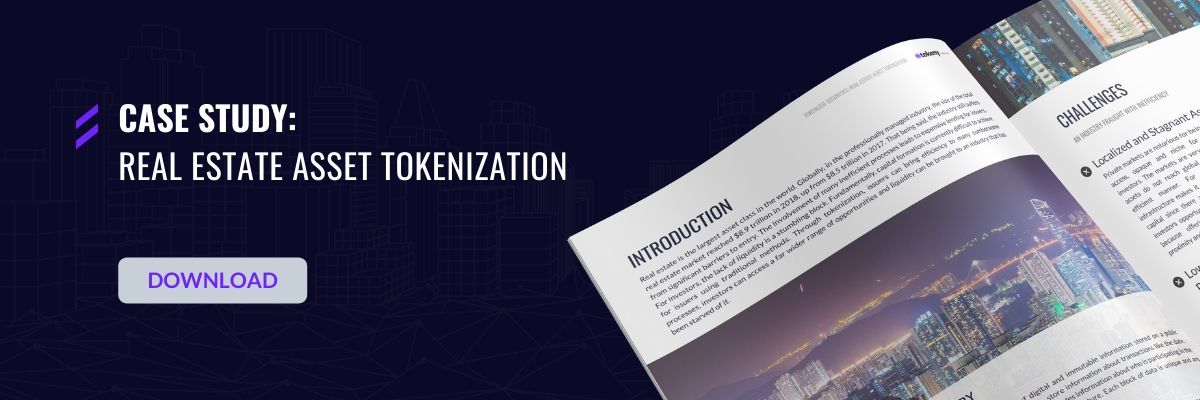Tokenized securities have attracted a lot of attention over the past year. Since we launched our ebook ‘Tokenized Securities’ in January 2019, we have received hundreds requests from projects wanting to utilize the blockchain to issue real estate assets. Interestingly, we’ve seen a growing increase in interest amongst traditional financial institutions.
In light of this, we’ve decided to write a real estate specific paper that outlines how applying control and compliance to the public blockchain brings efficiencies across the lifecycle of this asset class, especially for many a Real Estate Agent out there. Organising assests and investing in real estate, offers many opportunities and means that there is a lot of different elements to think about, if anything were to happen to the owner of the property/properties. It is important to think about the best way to sort out assests, whether it is going to be in a revocable vs irrevocable trust, this is one way that a property owner can get the reassurance that all their hardwork, with their real estate before they pass on, is being given to the right person afterwards. However, before getting to this point, it is important for the real estate to be as profitable as possible.
We have reviewed the traditional real estate market as it is today and the problems that are present in the industry. Through this case study we explain how a real estate asset can be represented in the form of tokens and what this process can do to accelerate this industry into the digital era.
First, let’s take a look at some of the challenges that are currently faced in the industry and discuss what this new technology can do to turn these into opportunities.
Challenges: An Industry Fraught with Inefficiency
Localized and Stagnant Assets
Private markets are notorious for being hard to access, opaque and niche for traditional investors. People will often need to find experts in the area they wish to enter, such as Rolling Hills Estates real estate agents for example. The markets are very local and the assets do not reach global investors in an efficient manner. For the issuer, this infrastructure makes it more difficult to raise capital since there are fewer investors. For investors, opportunities to assess are limited because offerings are usually based on proximity and personal networks.
Low Liquidity and Complex Portfolio Management
Real estate suffers from low liquidity because pricing and information is often unavailable and outdated. Buying and selling these investments is very difficult as the assets are priced on an ad-hoc basis. For an investor to liquidate their stake they usually involve a broker dealer who can take up to 10% in commission. Even if the investor is not in a long lock up period, unattractive fees prevent them from regularly buying and selling their investment.
Siloed Data and IT Systems Handled by service Providers
Today’s global real estate market revolves around many fragmented systems and siloed networks with almost no interoperability between them. Processes such as the onboarding of investors are slow and paper-based documentation is still required. These methods are often duplicated across service providers making the onboarding process slow, inefficient and expensive.
Opportunities: Using the Blockchain to Drive Efficiency in Real Estate
Global Distribution
Replacing the current infrastructure with blockchain technology will accelerate the real estate industry into the digital era by bringing forth a global network that allows issuers to target investors globally with little added cost. Tokenized securities live on a secure digital platform and can be accessed quickly by eligible investors given they have a laptop and an internet connection.
Improved Liquidity
Processes are greatly improved through tokenization as investors can quickly view their portfolio via a digital interface, use an online marketplace to find a buyer and liquidate their stake in a more efficient way. The cost for investors to buy and sell is dramatically reduced which will encourage more trading in secondary markets. The interoperable infrastructure of the public blockchain and the ability to view relevant data will add more flexibility and transferability between investors.
Connected Marketplace
Using the public-blockchain, real estate market participants such as regulators, investors, transfer agents and administrators can all access relevant information on a real-time basis, allowing them to make more informed and timely decisions. For investors this enables them to fractionalize and diversify their portfolio on a wider scale because of the increased amount of opportunities at their disposal. Asset owners can automate many tedious functions such as cap table management and corporate actions.
To read the full paper that includes the case study please download here:

